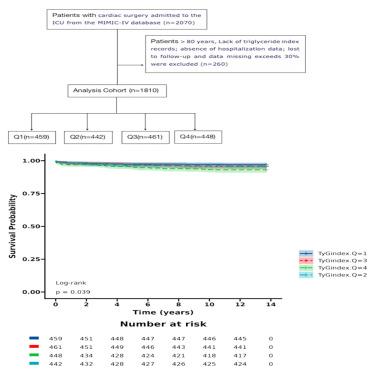Triglyceride index as a predictor of mortality after cardiac surgery
IF 4.6
2区 综合性期刊
Q1 MULTIDISCIPLINARY SCIENCES
引用次数: 0
Abstract
Background
The triglyceride-glucose (TyG) index, a marker for insulin resistance, has been linked to adverse cardiac outcomes. Its role in predicting mortality following cardiac surgery remains unclear.
Methods
This study analyzed 1,810 cardiac surgery patients from the Medical Information Mart for Intensive Care IV (MIMIC-IV) database, categorized by TyG index levels. Mortality was the primary outcome, assessed through Cox proportional hazards regression, time-dependent receiver operating characteristic (ROC) analysis, and restricted cubic splines.
Results
Over a 13-year follow-up, 83 patients died. Higher TyG index levels were associated with increased mortality risk (hazard ratio [HR] = 1.206, 95% confidence interval [CI], 1.121–1.297, p < 0.001). Time-dependent ROC analysis showed areas under the curve (AUCs) of 0.914, 0.857, and 0.801 at 1, 3, and 5 years, respectively. The TyG index-based model outperformed established scoring systems in predicting mortality.
Conclusions
Elevated TyG index levels are significantly associated with higher mortality risk after cardiac surgery, highlighting its potential as a prognostic marker in this population.

预测心脏手术后死亡率的甘油三酯指数
背景甘油三酯-葡萄糖(TyG)指数是胰岛素抵抗的标志物,与不良心脏预后有关。本研究分析了重症监护医学信息市场第四版(MIMIC-IV)数据库中的 1,810 名心脏手术患者,并按 TyG 指数水平进行了分类。死亡率是主要结果,通过 Cox 比例危险度回归、时间依赖性接收器操作特征(ROC)分析和限制性三次样条进行评估。TyG指数水平越高,死亡风险越高(危险比 [HR] = 1.206,95% 置信区间 [CI],1.121-1.297,p <0.001)。随时间变化的ROC分析显示,1年、3年和5年的曲线下面积(AUC)分别为0.914、0.857和0.801。结论TyG指数水平升高与心脏手术后较高的死亡率风险显著相关,这突显了其作为该人群预后标志物的潜力。
本文章由计算机程序翻译,如有差异,请以英文原文为准。
求助全文
约1分钟内获得全文
求助全文
来源期刊

iScience
Multidisciplinary-Multidisciplinary
CiteScore
7.20
自引率
1.70%
发文量
1972
审稿时长
6 weeks
期刊介绍:
Science has many big remaining questions. To address them, we will need to work collaboratively and across disciplines. The goal of iScience is to help fuel that type of interdisciplinary thinking. iScience is a new open-access journal from Cell Press that provides a platform for original research in the life, physical, and earth sciences. The primary criterion for publication in iScience is a significant contribution to a relevant field combined with robust results and underlying methodology. The advances appearing in iScience include both fundamental and applied investigations across this interdisciplinary range of topic areas. To support transparency in scientific investigation, we are happy to consider replication studies and papers that describe negative results.
We know you want your work to be published quickly and to be widely visible within your community and beyond. With the strong international reputation of Cell Press behind it, publication in iScience will help your work garner the attention and recognition it merits. Like all Cell Press journals, iScience prioritizes rapid publication. Our editorial team pays special attention to high-quality author service and to efficient, clear-cut decisions based on the information available within the manuscript. iScience taps into the expertise across Cell Press journals and selected partners to inform our editorial decisions and help publish your science in a timely and seamless way.
 求助内容:
求助内容: 应助结果提醒方式:
应助结果提醒方式:


